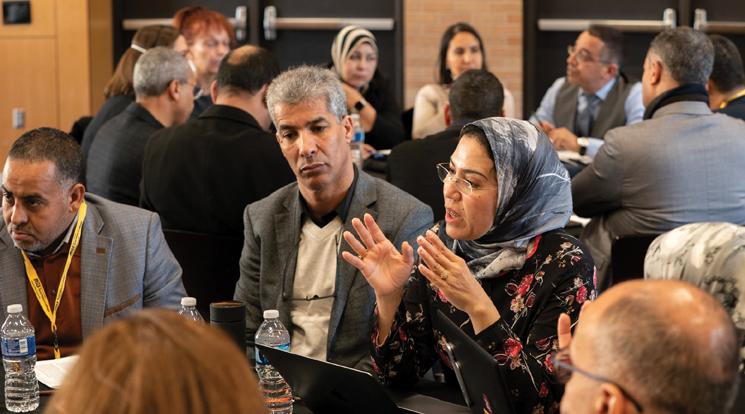Redesigning education systems globally

Morocco’s journey toward creating an internationally competitive education system began with a simple yet profound insight: Systems change starts with creating opportunities to build trust, understanding and collaboration.
The Kingdom of Morocco saw a need, more than five years ago, to better address student dropout rates, low levels of attendance, teacher absenteeism and inclusivity. The USAID-funded Higher Education Partnership–Morocco, implemented by Arizona State University’s Mary Lou Fulton Teachers College, brought together universities and teacher training institutions from all regions of Morocco, with the aid of experienced technical assistance and private sector agencies.
Outcomes of the project include a redesigned pathway for primary teacher preparation, expanded use of digital resources for educator professional development and a strengthened research-based culture. With the project in its final funded year, Morocco’s Ministry of Higher Education, Scientific Research and Innovation, which oversees higher education, and the Ministry of National Education, Preschool and Sports, which oversees K-12 education, are now working more closely together than ever to enhance teacher preparation by leveraging international best practices.
“There is a saying in Morocco that you can never really know a person until you have traveled with them or done business with them,” said Mohamed Tahiri, who had until recently been serving as director of Higher Education and Pedagogical Development. “Over the past five years we have had an unprecedented opportunity to do that, and really get to know each other through trust and understanding.”
Project outcomes
Tahiri was among more than 60 Moroccan educators who attended a weeklong symposium recently at ASU as part of the program’s emphasis on knowledge exchange and collaboration.
“What I am hearing from colleagues is their enthusiasm and engagement to work together and develop solutions,” said Abdelmojib Mrabet, director of teacher and staff training with the Morocco Ministry of National Education, Preschool and Sports. “We are strengthening the capacities of teachers at the elementary level, as it is a starting point to contribute to stronger student outcomes in the upper grades, and then into the university level.”
Moroccan educators ultimately designed and piloted a comprehensive approach to primary teacher preparation that bestows a three-year undergraduate degree in primary teaching, an associated year-long preparation in education and a one-year apprenticeship in teaching. The degree references international standards in inclusive education and pays particular attention to issues of gender equity. Other project details and results include:
- Roughly 300 Moroccan faculty and trainers across 24 institutions were brought together to exchange knowledge and insight into ways to enhance primary teacher preparation.
- More than 60 teacher preparation syllabi have been reviewed and revised.
- Roughly 15 Massive Open Online Courses are under development to support preservice teacher training for primary teachers. The digital materials will allow Morocco to reach more teacher trainees while providing standardized training across regions and institutions.
- Through an online research collaborative, Moroccan and MLFTC faculty are forging projects across educational institutions and expanding their research methods with an emphasis on primary teacher preparation.
The March visit to ASU allowed participants to reflect on the project’s developments, exchange information in person and prepare for future projects.
“This partnership has been more than just a professional experience,” said Latifa Hafdi Idrissi, an associate professor with ESEF-Ibn Tofail University in Morocco. “It has been a transformative journey. I've engaged in collaborative endeavors with colleagues hailing from both Morocco and the United States, and we've shared knowledge and cultivated inventive educational practices.”
Sharing knowledge
MLFTC’s experience with education systems redesign has made it a recognized resource for other education groups globally, with collaborations involving education ministries in countries such as Egypt, Georgia, Ethiopia and South Korea.
The collaborations offer a chance to dive deeper into principles such as Universal Design for Learning —a set of principles that can be incorporated into course design to create inclusive learning environments both in person and online. The collaborations also will allow the teams to explore emerging education design frameworks and initiatives, such as:
- Principled Innovation: A framework, developed at MLFTC, for decision-making aimed at preparing students to become effective educators and caring citizens. It can be integrated into teacher and leadership preparation programs and curricula, as well as incorporated into undergraduate coursework. It is now part of ASU’s design aspirations.
- Next Education Workforce: Through this initiative, MLFTC works with schools and other partners to provide all students with deeper and personalized learning by building teams of educators with distributed expertise. This approach empowers educators by developing better ways to enter the profession, specialize and advance.
The project has brought together educators and education stakeholders from across institutions and regions to form Research and Development Groups. Members of these groups engaged in capacity-building workshops while revising primary teacher preparation curriculum to ensure a transformative education experience for future teachers in Morocco.
“This experience has been equally transformative for so many MLFTC colleagues through this exchange of information and knowledge on a global scale,” said Nicole Thompson, professor and vice dean of the college’s division of teacher preparation.
Once the grant timeframe concludes, in September of 2024, a partnership between MLFTC and the alliance will continue. The aim of this, according to Tanya Pinkerton, clinical assistant professor with MLFTC’s division of teacher preparation is to share in research and education workforce design. Moroccan educators also have expressed interest in extending their teacher capacity building from primary grade levels to upper grades.
“We look forward to continuing to work with our international colleagues to generate more equitable learning outcomes for all,” Pinkerton said.